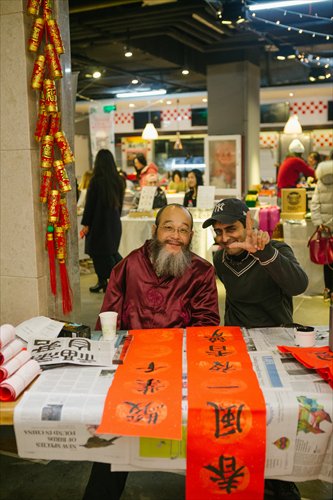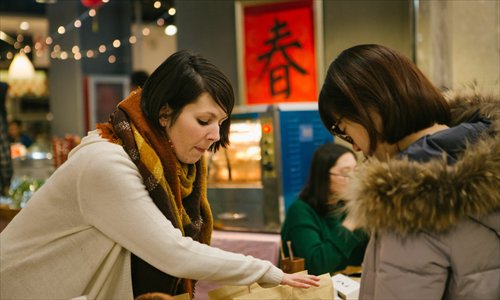Expats adapt to and put their own spin on Chinese New Year purchasing
Gabriela Filipovici, a 42-year-old Romanian, who has been living in Beijing for 21 years, has been very busy of late. She's been absorbed with buying nianhuo, special merchandise sold for Chinese New Year. This year's Spring Festival, the annual celebration that marks the start of the new lunar calendar, runs from February 7 to 13.
"Chinese New Year is a very important occasion for my family," said Filipovici whose husband is Chinese. "We have a lot of guests every year, and I like to have a clean and beautiful apartment. I will also buy new clothes for my husband, son and mother-in-law."
She has been bustling around Beijing buying Spring Festival goods for more than a week now. Last Saturday, she went to a festival fair, a flower market and a furniture and appliance store, all in one day without even a break in between. She had to get new potted plants, new plates and carpeting, and food for when the festivities begin.
Having made China her home for several years now, Filipovici has long been doing the Spring Festival shopping for her household. However, whereas previously, she would be one of a few foreigners shopping for the festivities, in recent years, the numbers have grown.
"More [foreigners] are following the traditions of Chinese New Year by buying nianhuo such as fireworks, decorations and things in red," she said.
Erica Huang, founder of the Farm to Neighbors' Spring Festival Market, a market in Beijing's Liangmaqiao area that sells nianhuo to the expat community, told Metropolitan that increasing expat participation in the lunar festivities led her to launch the two-day market.
"We have over 60 stalls providing various things for Chinese New Year," she said, adding that despite it being the first staging of the event, more than 1,200 customers came out Saturday, more than half of whom were expats.

An expat poses with a calligrapher after purchasing a Spring Festival couplet at the Farm to Neighbors' Spring Festival Market in Beijing on January 30. Photo: Li Hao/GT
Expats drawn in by the festive air
David Woods, a 44-year-old Australian who has been in Beijing with his wife and three children for over a year, excitedly bought all kinds of things for Chinese New Year.
Last Saturday, he and his family went to the Farm to Neighbors' Spring Festival Market and saw a lot of Chinese and expats there. They bought Spring Festival couplets and watched as a calligraphy artist formed them. He said it was amazing to see how they came out for the first time.
The day before, they had gone to Wangfujing to buy clothes for their children. Although the streets were packed, they had a great time. "We got [our daughter] a cotton cheongsam, and she likes it very much. Today, she could not wait to wear it to the market," he said.
This will be their second Chinese New Year in Beijing. Woods plans to go all out this year, doing more celebrating inclusive of going shopping at the bustling temple fairs and going around some hutong to try some delicious food.
Dan Taylor, a Briton who has been in Beijing for over two years, also found that expats are spending more time in the city. "Travelling is great, but staying in Beijing has its perks!" Taylor said.
He said although many stores and restaurants will be closed, there is always an air of closeness and warmth around the people who stay. "This is where the essence of the festival lies. Whatever your condition is, you can always feel the warmness by being with someone at this time."



An increasing number of expats are following the tradition of buying Spring Festival merchandise ahead of Chinese New Year. Photos: Li Hao/GT
Observing Spring Festival traditions
Alex Jennings, a 38-year-old Australian teacher, said in recent years, more expats have adapted to the tradition of lighting fireworks, giving red envelopes, buying new clothes, and red things symbolizing wealth and prosperity.
"There is an energy around shopping at Chinese New Year and lots of sales and discounts," she said, who has been living in Beijing for the past 15 years.
Jennings likes to buy new year decorations and fireworks. She also likes to go to the Dongyue Temple in Chaoyang district, which she thinks is one of the best places to buy traditional Chinese handicrafts. She even follows the tradition of getting a haircut before Chinese New Year.
Last year, Taylor bought some amazing fireworks. "They were very powerful. Back in the UK, our fireworks are a little bit lackluster. You guys really know how to party with a bang," he said.
For Jocelyn Eikenburg, a 38-year-old American who has been in China for seven and a half years, shopping for Chinese New Year is a very important annual celebration, just like Christmas.
"It's interesting because, in some ways, the shopping culture reminds me of preparing for the Christmas season back in the US. Like Christmas, we spend a lot of time shopping for gifts to family and friends," said Eikenburg, who now resides in Hangzhou, Zhejiang Province with her Chinese husband.
She bought all kinds of presents for her family and friends and tries to stick to the colors of the festival, even when buying foreign goods. This year, she bought a large crate of imported Spanish red wine to give as a gift. The wine bottles have a festive red label embossed with gold grape vines, and her husband's family love drinking red wine during the holidays, so it's a perfect gift for Chinese New Year, Eikenburg said.
Chinese traditional food and snacks are also vital to the new year tradition. Every year, Eikenburg and her husband will help the family prepare what they call miguo in the local dialect, a type of savory turnover made with rice dough and filled with vegetables.
Everyone, from her husband's grandmother to her five-year-old niece, sits around the table rolling out the dough, filling the turnovers, and sealing them.
"It's one of my favorite family moments from Chinese New Year, just being together with everyone to make this traditional snack," said Eikenburg.
Woods said it is interesting that many things, such as fish, have the symbolic meaning of good luck and blessing. "In our culture, we do not buy things like fish to bring good luck. I think Chinese New Year is more rich and colorful than Christmas. Christmas is more about shopping and giving presents. But for Spring Festival, there are many other traditions to follow."
Same tradition, different approach
While some foreigners have adapted to the culture as is, others have made little changes to the traditional practices to balance the cultural differences that might come up.
Eikenburg recently bought three winter jackets and a sweater to wear during the festival. When her mother-in-law first suggested she buy some new clothes for the festival, she initially balked at the idea. Back in the US, she would not have thought to get them as she was raised to be frugal when it comes to shopping for clothes.
"But things are different here," she said. Her mother-in-law reminded her that it's a tradition to start the new year with new clothing, and it's important to wear something new, so the family looks good in public.
"After all, the village where my husband's family lives is a very small, tight-knit community where everyone knows everyone, and everyone notices if you're still sporting the same jacket you had on last year. What you wear is even more important around here than what you eat," Eikenburg explained.
Jennings said compared with Chinese people who do a lot of shopping, it is less of a hassle for some expats who put a personal spin on the gift giving tradition.
"My Chinese friends are buying a lot for the celebration. They usually complain about how much they spend, but they have to show they are doing well and are successful," she said. "While as for me, this time of year is usually quiet, so I won't do as much shopping as some of my Chinese friends."
Aside from shopping, Filipovici also participates in the festivities through food and gift preparation. She tries to merge her culture with that of her husband's by preparing some special meals. On New Year's Eve, they will have Chinese friends and relatives over to celebrate, and she will cook her hometown food to let Chinese guests experience the Romanian way of spending holidays.
She also developed her own way of giving gifts during Spring Festival. Instead of fruits, she buys gifts according to the age, likes and needs of the individuals she visits.
"Many Chinese buy fruits, but then everybody's home ends up with so many that they don't know what to do with them. So, I try to buy something that I think they will need and like," said Filipovici. At first, her husband was quizzical, but he has since come around to the idea.
"I like to respect the tradition but sometimes some thoughtful changes are not bad," she said. "They know when I pay them a visit I will not bring fruits."
Eikenburg said no matter what you buy and how you celebrate, Chinese New Year is spending time with family and friends and showing how much you care about them. "Being so involved in Chinese New Year lends a certain holiday spirit to the season - a spirit I wouldn't have known so intimately if I hadn't come to China."
Newspaper headline: Buying nianhuo!